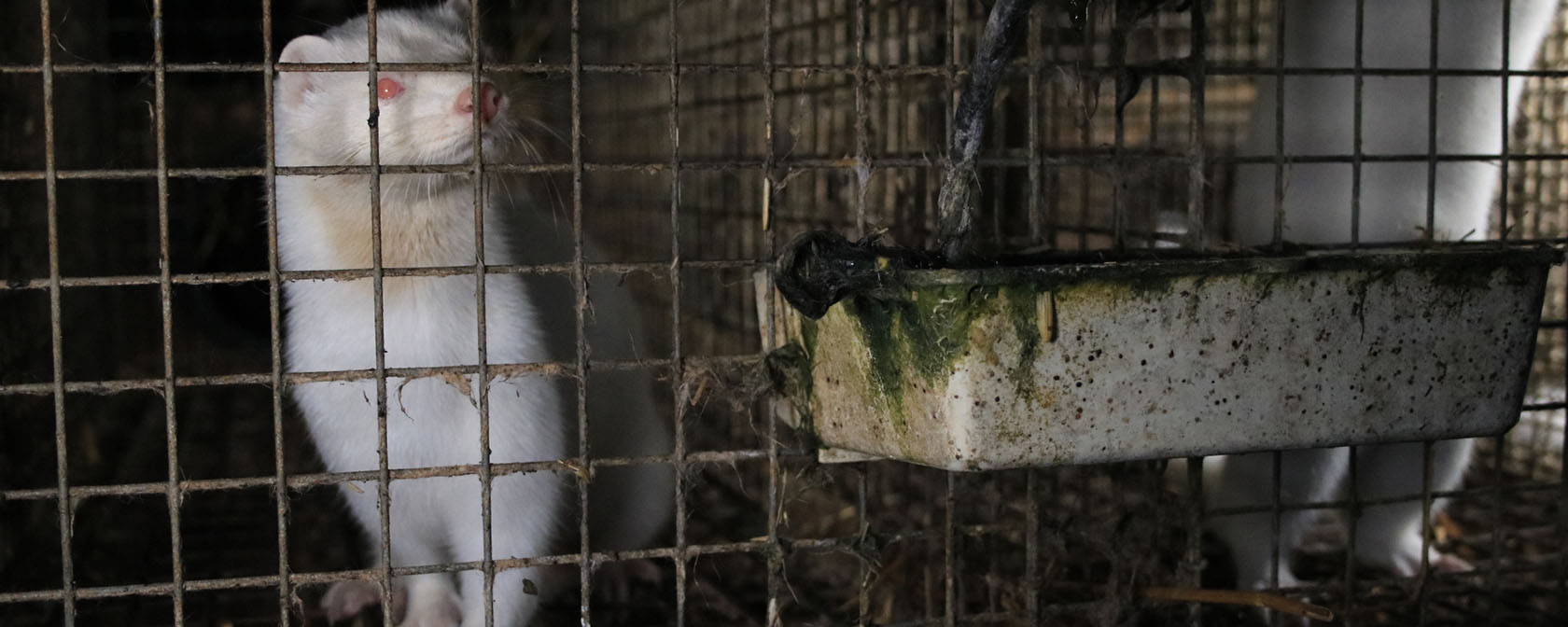By Sara Amundson and Kitty Block
U.S. Rep. Adriano Espaillat (NY) has just introduced a bill that responds to growing concerns about the public health threat posed by mink fur factory farms. The Mink: Vectors for Infection Risk in the United States Act (‘‘Mink VIRUS Act”), H.R. 3783, seeks to prohibit the farming of mink in the U.S.
Every year at U.S. fur farms, more than a million mink are killed—typically by gassing to avoid damage to their pelts— for no purpose other than to provide trim on coats and poms on hats, purses or gloves. They suffer immensely on these factory farms, where they typically live in horrendous conditions, cramped into small wire cages that deny them the ability to express their natural behaviors such as running, digging and swimming.
Housing thousands of animals in such close proximity enables disease to spread, and undercover investigations repeatedly find these animals living with infections, injuries and deformities, and even dead animals left to decay in their cages. It’s no wonder then that mink factory farms are breeding grounds for diseases that can be contagious and potentially life-threatening to humans.
The cruelty and the threat to public health these operations pose provide ample reason to end the fur trade, and we have been fighting to do so for years through consumer outreach, legislation and corporate campaigns to secure commitments from major fashion brands to end their use of fur. We have seen great success in stopping the sale of new fur products on the local level in the U.S. So far, 12 U.S. municipalities have passed ordinances banning the sale of new fur products, and California implemented a similar ban in early 2023. Currently, six states and the District of Columbia, along with numerous local communities, are considering such legislation.
Yet the U.S. still lags behind other countries. Over the last two decades, 19 European countries have passed legislation to ban the farming of animals for fur. In just the last two years, France, Italy, Ireland, Estonia, Latvia and Malta have introduced legislation to prohibit or phase out fur factory farming. Switzerland and Germany have implemented strict welfare regulations that have effectively brought fur farming to an end, and Denmark, Sweden and Hungary have ended fur farming of certain species. A European Citizens Initiative to ban fur farming and farmed fur products surpassed more than 1.7 million signatures and is currently going through the process of consideration within the European Commission. The Canadian province of British Columbia has also banned mink farming.
Unfortunately, as more and more countries take a stand against fur factory farming, the U.S. could potentially become the second-highest fur producing country in the world, surpassed only by China.
For that and other reasons, the introduction of the Mink VIRUS Act is timely. Some months ago, mink on a fur farm in Spain tested positive for the deadly, highly pathogenic avian influenza virus. Researchers believe it likely that the strain had been spreading between mink on the farm, the first reported instance of mammal-to-mammal transmission of avian flu. Scientists have raised alarm bells that mink factory farms are acting as the perfect petri dish for the virus to mutate, with dangerous implications for public health.
Moreover, new outbreaks of SARS-CoV-2 continue to emerge on fur factory farms. Mink on more than 480 mink fur farms across 12 countries have been found to be infected with COVID-19, including in the U.S.: outbreaks were reported in Italy in November 2022 and Poland in January 2023.
Not only are farmed mink highly susceptible to COVID-19, but they are also capable of transmitting the virus to humans. Farmed mink-to-human transmission of the virus has been reported in at least six countries so far, including the U.S. Moreover, transmission of COVID-19 from fur-farmed mink to humans could introduce new variants, undermining the effectiveness of vaccines. Millions of animals throughout hundreds of mink fur farms have been culled in Europe in response to SARS-CoV-2. Now, more than 50,000 mink have been culled on one fur farm in Spain as a result of avian flu. This level of disease risk for the sake of fur fashion simply cannot be justified.
It is time for the U.S. to take meaningful action to send the fur industry to its forever home—the dustbin of history. Given that fashion products can easily be replaced with humane and eco-friendly alternatives, U.S. policymakers should no longer ignore the harms caused by the fur industry.
Please reach out to your HSUS state director now to learn how you can get involved to help end the sale of new fur products in your community. And contact your U.S. legislators to ask them to support the Mink VIRUS Act.
Kitty Block is CEO of the Humane Society of the United States.




